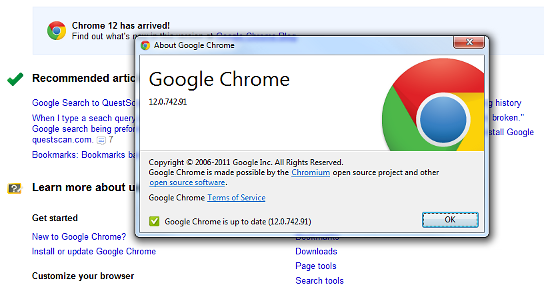Google Chrome 12 is Out, and I Am Reminded Why I Love It!

Google Chrome 12 is out, and it has some awesome new features, but I am reminded that I love it because the version of Chrome I was reading the article about the upgrade on had already upgraded itself to the new version! That is just SO cool!
Google Releases Stable Version of Chrome 12
“Google Chrome 12 is now the stable release of Google’s web browser, bringing several improvements in security, privacy and graphics capabilities.
Chrome now checks downloaded files for malware, and Google claims it has designed the feature in such a way that it doesn’t have to know which URLs you visited or which files you downloaded to be able to detect malicious files.
You can now also fine tune the data that websites store on your computer, including Flash Player’s Local Shared Objects (also known as Flash cookies), directly from Chrome.
On the graphics front, Chrome 12 includes support for hardware-accelerated 3D CSS, which enables some nifty effects such as rotating and scaling videos. Try this Chrome Experiment to see some of the new features in action.
Finally, Chrome 12 brings several minor improvements such as an improved interface for setting a homepage and searching for Chrome Apps directly from the address bar.
Google Chrome 12 is available at www.google.com/chrome. Existing users will be automatically updated to the new version in the next couple of days.”
You can check to see if you are up-to-date by going to the Chrome “About” (click on the “wrench” in the upper right hand corner, then click on the “About Google Chrome” option.)